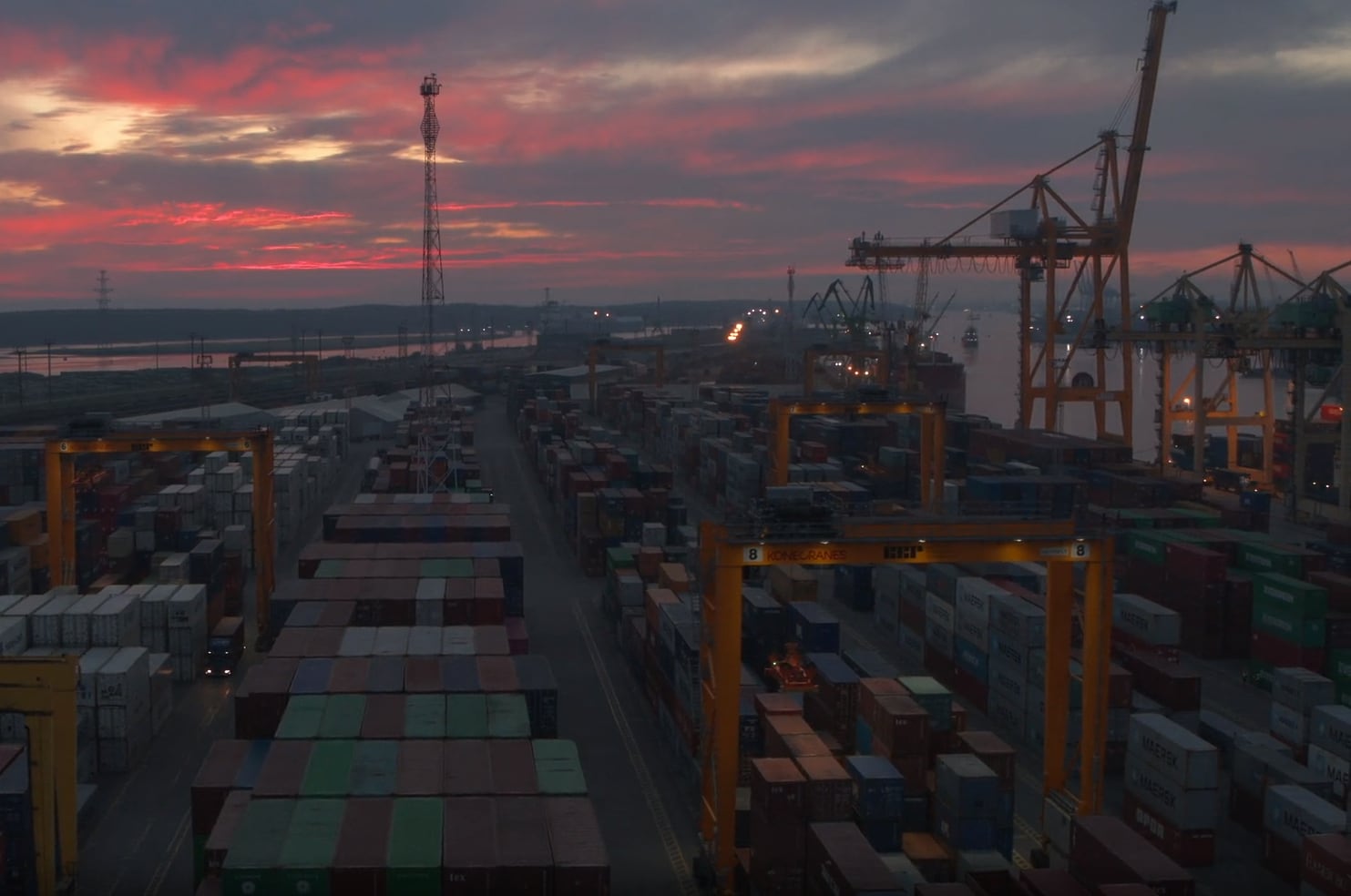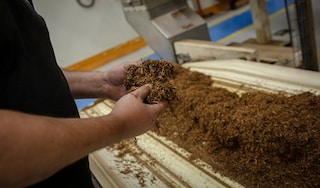Illicit trade, including illegal cigarettes and possible contraband and counterfeit of smoke-free consumables and electronic devices, is a serious crime that:
|
Tackling illicit trade is essential to protecting our brands, value proposition, and ensuring that product quality standards and scientific validation procedures are met.
PMI is working internally and externally to combat fakes and prevent the smuggling and counterfeiting of our products
|
Illicit trade is neither petty nor victimless; it is a high-profit, low-risk crime that needs to be tackled by fostering public-private coalitions that are able, and willing, to make a change.
To succeed in our mission of delivering a smoke-free future, we must ensure that there are no criminals sustaining a black market for cigarettes and other tobacco products. In a smoke-free future, there is no place for illicit trade.
Our approach
Consumers must not be exposed to contraband or counterfeit products. We apply innovative and sophisticated authentication and security technologies to all our products to protect our consumers and brands from criminals. Online tools, which leverage artificial intelligence, help us monitor and address the issue by identifying the largest unauthorized resellers on social media and e-commerce platforms.
To fight the diversion of our products, for several years we have successfully applied a risk-based approach to focus our resources on where they are most needed across our markets. PMI’s Anti-Diversion Governance Committee—among whose members are senior executives from Finance (central and regions), Risk & Controls, Law, Ethics & Compliance, Commercial and External Affairs, including Illicit Trade Prevention (ITP)—has corporate oversight on diversion risk-prevention for our products. We have a dedicated global team of ITP professionals and have invested significant resources to ensure strong controls in our supply chain, to raise awareness of the consequences of the illegal tobacco trade, and to develop workable and collaborative solutions to put an end to this global challenge.
We also support and fund external organizations through our PMI IMPACT global initiative to help third parties better target illegal trade by fostering and mobilizing a network of like-minded organizations and institutions against this global issue.
We believe that effective regulation is fundamental to achieving real progress against illicit trade, and that governments have a key role to play in ensuring more efficient enforcement of laws and penalties. That’s why we are strong supporters of the objectives and principles of the WHO Framework Convention on Tobacco Control (FCTC) Protocol to Eliminate Illicit Trade in Tobacco Products.
Our progress in 2021
Protecting our brands and fighting the diversion of our products.
Capacity building and collaboration with law-enforcement agencies
In 2021, PMI continued supporting and hosting online workshops around the world. The subjects included:
- Intellectual property rights
- Training customs officials worldwide and sharing insights on how to differentiate between genuine and counterfeit goods
- Sharing the latest illicit trade trends
- Providing supply chain information and showing how illicit tobacco trade activity varies from one region to another
Spain
More than 1,900 law-enforcement agents from the three main enforcement bodies (Guardia Civil, National Police, and Customs) attended 14 sessions organized by PMI. In June, 115 Spanish customs officials, working in several ports and airports in the country, were part of an online risk profiling seminar. This was the first time that such training had taken place in Europe.
United Arab Emirates
The industry joined efforts with the UAE Ministry of Economy to train law-enforcement agencies (including customs, police, Emirates Economic Department, Quality and Conformity Council, and Federal Tax Authority) in Abu Dhabi, Al Ain, Dubai, and the northern emirates. The sessions covered illicit trade threats and issues concerning both cigarettes and smoke-free products in the UAE.
The Philippines
PMI conducted 14 virtual and in-person training sessions for more than 500 law-enforcement agents relating to the illicit cigarette trade, such as authentication techniques for both combustible and smoke-free products, including devices. Certificates of Commendation were awarded by local authorities to PMI’s illicit trade-prevention experts for their active participation and contribution to fighting this problem.
Colombia
PMI supported law-enforcement agencies in several areas, with 10,140 officials from different entities receiving training, including the police, customs officials, and the Colombian Navy, among others. The sessions covered:
- Raising awareness of the issue of illicit trade
- Helping to differentiate legal and illegal tobacco products
- Sharing information about criminal networks’ methods and their main smuggling routes
- Providing publicly available information about vessels involved in transporting illicit tobacco products
- Facilitating specific training through third-party experts on container risk-profiling, as well as on the existing regulation to fight illicit trade
Additionally, within the Fiscal and Customs Police’s “Integrated Center for Permanent Anti-Contraband Policing,” which actively cooperates with public and private entities, PMI shared information with law-enforcement agencies, leading to successful implementation.
PMI’s support in the fight against illicit trade has been recognized by local law-enforcement authorities. In December 2021, the Colombian National Police awarded a medal to business leaders, including PMI representatives, in recognition of their “invaluable contribution to the fight against illicit trade of tobacco and its unconditional support to the Fiscal and Customs Police.”
Throughout 2021, PMI continued partnering with Société Générale de Surveillance S.A. (SGS), an inspection, verification, testing, and certification company, to provide Risk Profiling Training to law-enforcement agents across all regions in which the company operates.
In October, PMI supported SGS to provide capability trainings to customs officials from eight member states of the Association of Southeast Asian Nations (ASEAN) coordinated by the EU ASEAN Business Council. They were joined by Colombian, Jordanian, and Senegalese customs agencies. These workshops conducted together with SGS aimed at enhancing the skills and knowledge of customs officers, while encouraging collaboration between member states and public-private partnerships in the fight against illicit trade.
Supply chain controls
Revamped internal policies
We have identified 20 markets with higher risk of illicit trade in both combustible and smoke-free products. For these markets, we’ve enhanced our anti-diversion tools, such as the “Know your customer” policy, volume monitoring, and tracking-and-tracing technologies to ensure that our products are sold legally in the markets for which they are intended.
We continuously monitor the evolution of risk drivers in “Watch-list markets” to address any emerging issues related to supply chain controls and consider any new areas of vulnerability associated with our smoke-free products.
Tracking and tracing
We continued expanding the coverage of our track-and-trace processes and technologies, reaching 140 countries, 24 combustible product factories, eight smoke-free consumable factories, and seven electronics manufacturing services facilities/fulfillment and reverse logistics hubs. On average, 25 million master case scanning events of PMI products are registered each month in the supply chain and are reported to PMI’s central Product Tracking database, iTrack, from more than 700 physical warehouses. Furthermore, we are able to track packs throughout our internal supply chain in different jurisdictions and—with an extended reach—up to point-of-sales in specific markets (e.g., Europe and Russia) where our external partners/distributors need to comply with the same regulatory requirements. Approximately two billion traceable packs are additionally registered in our central iTrack database every month. Finally, in 2021, we reached a milestone of 200 million unique IQOS devices cumulatively recorded in iTrack.
As new technologies emerge, we make it a priority to understand how we can leverage them to eliminate fakes and contraband products, further secure our supply chain, and deter criminals from deceiving consumers.
A focus on our smoke-free products
In July 2020, we formalized illicit trade prevention requirements to protect our smoke-free devices and consumables in our internal product standards, and included them in the industry voluntary standards. Those requirements mandate the application of security features made of both visible (e.g., serialized digital code, color-changing ink, holograms, etc.) and invisible elements (taggant microprint, UV ink, etc.) on the device or critical components, as well as tamper-proof security features or system features (e.g., soft or firmware). In 2021, our illicit trade prevention experts supported the PMI Product Group and worked on the definition of product security features for the new product platforms under development.
We are mitigating illicit trade risks using tighter contractual arrangements (e.g., anti-diversion and anti-counterfeiting clauses with our distributors and suppliers) and more robustly controlled reverse logistics processes for our electronic products (e.g., devices), based on centralized inspection and recycling. We have embedded product authentication checks in critical processes, such as in-market product return and consumer care processes, as well as at the PMI Reverse Logistics Hubs—or CIRCLE (Central Inspection and Recycling for a Closed Loop Economy)—allowing us to identify suspected counterfeit devices and remove them from the supply chain. In 2021, collaboration between our ITP experts in our Operations Center and new markets launching smoke-free products allowed us to raise awareness about the diversion and counterfeiting risks attached to such products. We also further improved our ability to easily check, by means of technology, the product information of our consumables and electronic devices, as well as their movements through the supply chain.
Addressing counterfeits in the EU
In 2021, the manufacturing of fake tobacco products continued to be one of the main illicit trade threats faced by the industry. PMI is committed to fully collaborating with law-enforcement agencies to dismantle clandestine factories manufacturing fake tobacco products and disrupt the flow of counterfeit goods across borders, with the aim of protecting consumers and our brands.
Counterfeit cigarette consumption continues to rise in regions such as the European Union, and is a massive growth industry for domestic and international criminal enterprises. In June 2021, KPMG released its annual study “Illicit cigarette consumption in the EU, UK, Norway and Switzerland,” commissioned by PMI, showing that illicit cigarettes accounted for 7.8 percent of total cigarette consumption in 2020, representing 34.2 billion cigarettes. Counterfeit consumption skyrocketed by an unprecedented 87 percent compared to the previous year, driven by a surge of counterfeits in France, which alone accounted for over two-thirds of the total of 10.3 billion sticks of fake cigarettes in the EU market.
This trend accelerated with COVID-19 in 2020, and research shows that the situation has worsened during 2021. This is why we are significantly increasing our efforts in the fight against counterfeiting, partnering with law-enforcement agencies across the EU where it is on the rise.
Interviews with law-enforcement agencies conducted by KPMG as part of the study indicated that organized criminal groups continued to move their operations inside EU borders, as a large proportion of illicit whites and counterfeit cigarettes are believed to be manufactured in illegal factories within the EU. While this trend persists across 2021, there is, at the same time, an upsurge of inflows of counterfeit cigarettes originating from Asia and transiting via free-trade zones, as evidenced by law-enforcement seizures.
PMI will continue to invest in the fight against counterfeiting, with the aim of assisting the authorities in countering criminals profiting from the clandestine manufacture of fake tobacco products within EU borders. Collaboration between private and public sectors (law-enforcement agencies, NGOs, international organizations, brand owners, and suppliers) remains crucial, as we continue to develop a better understanding of counterfeit operations, mapping out areas for potential regulatory improvements, participating in litigation, raising awareness on the issue of counterfeiting, and extending training to many law-enforcement agents on the front line.
Partnering with others to tackle a systemic issue
Our collaboration partners include, for example, the Munich Security Conference, the International Institute for Strategic Studies, the OECD Task Force on Countering Illicit Trade (TF-CIT) and the BIAC Expert Group on Anti-Illicit Trade, the Italian Institute for International Political Studies (ISPI) and Rome MED-Mediterranean Dialogues, and non-profit organizations such as Concordia. We also join forces with maritime operators. We support and help law-enforcement agencies by inspecting and authenticating seized products, performing illicit product forensic evaluation and profiling, sharing intelligence on emerging routes and trends shaping the black market, and training officials on the authentication and security features we use to protect our products.
In January 2021, PMI signed a memorandum of understanding (MOU) with the National Intellectual Property Rights Coordination Center (IPR Center) at the U.S. Department of Homeland Security (DHS) to assist and support Homeland Security Investigations’ (HSI) illicit tobacco trade operations and other intellectual property rights investigations.
The MOU is focused on comprehensive strategies and coordinating efforts to disrupt and combat all forms of illicit tobacco trade, as well as addressing vital areas of intellectual property, brand protection, and anti-counterfeiting strategies. The agreement will also facilitate knowledge transfer between the center and PMI to share mutually beneficial information and research to combat the illicit tobacco trade and assist in other intellectual property rights investigations.
In April 2021, new amendments to the MOU between the Egyptian Customs Authority and PMI came into place. This was an important milestone in the fight against the illicit trade in reduced-risk products, and an important step preceding the launch of IQOS in Egypt in August 2021. New articles included:
- Assist the Administration by inspecting seized heated tobacco products (HTP), as well as e-cigarettes and machinery; examining and submitting reports on samples of confiscated HTP and e-cigarettes bearing the trademarks of PMI; and providing information.
- Organize training sessions for the Administration’s personnel or participate in training sessions organized by the Administration to assist the Administration’s personnel in recognizing and identifying illicit reduced risk products bearing PMI trademarks.
PMI and Egyptian customs authorities agreed to continue collaborating in the ongoing efforts to fight illicit trade, including in smoke-free products.
Also in April 2021, PMI signed a cooperation agreement with Montenegro’s Customs Administration to join efforts in the fight against illicit tobacco trade. Ivan Miletic, PMI’s Director of External Affairs for South East Europe, said at the time, “We are determined to cooperate with the Customs Administration on all activities aimed at reducing and eliminating counterfeit and smuggled cigarettes on the Montenegrin market,” adding, “It’s key that industry and government cooperate in informing the public about this problem, in order to raise awareness about the harmfulness of the illicit trade in tobacco products for the state budget, companies and adult consumers in Montenegro.” The following month, PMI signed another MOU, this time with the Customs Service of Moldova, aiming to strengthen the Customs Service’s capacity to combat smuggling and illicit trade in tobacco products, including in activities related to data and information sharing, operational capacity of anti-fraud subdivisions, and training of customs officials.
In the Philippines, PMI relaunched—in cooperation with the Federation of Philippine Industries, an organization of Philippine manufacturers—an education and information campaign titled “Fight IT,” aiming to raise awareness in retailers and consumers. The initiative, which included joint activities with retailers, ultimately reaching out to government offices, police stations, marketplaces, and social media platforms, was aimed at changing perceptions in consumers towards illicit trade.
PMI IMPACT
PMI IMPACT is a global initiative launched in 2016 to support public, private, and non-governmental organizations to develop and implement projects against illegal trade. To date, it has allocated a combined USD 48 million for the implementation of 60 projects in 30 countries as part of the initiative’s first and second funding rounds. The organizations awarded a PMI IMPACT grant come from the European Union, Eastern Europe, the Middle East, Asia, and North and South America. They represent a broad range of sectors, including think tanks, academic institutions, universities, and law enforcement authorities.
PMI IMPACT supports projects that reduce or prevent illegal trade, while enabling organizations to build innovative and sustainable solutions, fostering public-private partnerships, and facilitating the debate around illegal trade at a global, national, and regional level. PMI IMPACT is honored to be able to rely on the knowledge of the PMI IMPACT Expert Council members in the fields of law, anti-corruption, and the fight against organized crime and illegal trade. The council of external independent experts plays an important role in the evaluation and selection of the project proposals for PMI grants.
In 2021, PMI IMPACT launched its third funding round. We welcome new projects that foster partnerships and create synergies to enable sustainable solutions in the battle with illegal trade. The new round—which will close its call for submissions on August 15, 2022, focuses on funding projects aimed at reducing or preventing illegal trade, as well as countering the negative consequences of illegal trade for individuals, their families, and communities.
Proposals from third parties had to focus on one of the following topics: Border control; capacity building; restorative justice and victims’ protection; network engagements, awareness building, and international cooperation; and COVID-19 and the threat of illicit trade. Bringing innovation and technological advancement to the fight against contraband and counterfeited goods is essential, especially during the pandemic. This is why PMI IMPACT opened its program to projects aimed at limiting the threats of counterfeited and substandard vaccines, medicines, medical supplies, and personal protective equipment.
Since late 2021, PMI IMPACT has been engaging with inspiring third-party organizations from around the globe who submitted project proposals for funding. By the end of 2022, the complete list of new grantees is expected to be announced.
To raise awareness about PMI IMPACT and the new round of funding, PMI developed four profile videos in 2021 highlighting the scale and issue of illicit trade, and the role played in this fight by PMI IMPACT, as well as raising the profile of past selected grantees of the initiative. These new visual assets allowed PMI to leverage its global program at a regional, national, and global level in coordination with our regional and market offices all over the world.
Two videos feature selected past PMI IMPACT grantees (PMI IMPACT: Securing the seas and How INTA Is fighting illegal trade with help from PMI IMPACT), while the other two looked more broadly into the illicit trade problem (PMI IMPACT: We need a network to fight a network and PMI IMPACT: Fighting illegal trade in all forms).
Through external media campaigns on third-party platforms, the visual assets included a call to action to the PMI IMPACT initiative, seeking to raise awareness about illegal trade in its various forms, as well as calling on interested third-party organizations to participate in the program. The campaign spanned from July 2021 until the end of October 2021 and generated over 5 million views and 35.5 million impressions. The PMI IMPACT videos on PMI’s own YouTube channel have also seen more than 1 million views.
Selected grantees from the first and second funding round were able to complete their projects 2021, including:
Business Advisory Group on Migration
Project: Business and Migration: Strengthening the dialogue between the private sector and governments
The aim of the project was to bring out the positive contributions of migration around several regions (Africa, South America, Middle East and Asia) and enhance the dialogue between the private and public sectors on how to strengthen regular frameworks for migration. The Business Advisory Group on Migration facilitated a needed dialogue between organizations from various backgrounds. In June 2021, the Business Advisory Group joined the global campaign "It Takes a Community," launched by the Global Forum on Migration and Development (GFMD) Ad Hoc Working Group on Public Narratives on Migration. The aim was to “highlight how migrants and their fellow community members are working together to make the places where they live and work more productive, innovative, caring, safe, and welcoming.”
Basel Institute on Governance
Project: Stop corruption from fueling illicit wildlife trafficking along the East Africa—Southeast Asian trading chain
This project promoted systematic, intelligence-led action against illegal wildlife trafficking (IWT) networks along the East Africa–Southeast Asia trading chain. It focused on uncovering and targeting illicit financial flows, strengthening the ability of law-enforcement agencies to investigate and prosecute transnational IWT-related financial crimes, and improving coordination across public, private, and non-governmental sectors. A variety of successful learning resources has been created, including case studies, online courses developed under the program in partnership with WWF and ACAMS, and an Open Source Intelligence in Wildlife Crime e-learning program.
In 2021, the Basel Institute co-hosted a series of events together with the OECD to highlight the convergence of environmental degradation, financial crime, and illicit trade.
The Mekong Club
Project: Leveraging private sector engagement to reduce trafficking in persons in target sectors
The aim of the project was to develop tools, data collection techniques, and training to engage the banking, manufacturing, retail, and hospitality sectors in tackling the issue of modern slavery. The Mekong Club worked with the private sector in a positive, supportive, and safe manner to raise awareness of the issue of modern slavery and to enlist the private sector’s suggested solutions. It was done through working groups, corporate presentations, advisory services, and learning resources.
The project tapped into the technology, data, problem solving, and innovation potential of the private sector to come up with new, impactful tools and approaches to identify solutions to address modern slavery. These include a Responsible Recruitment Toolkit, Modern Slavery Statement Content Guide and COVID-19 e-learning videos. A system to track the reduction of modern slavery through private sector interventions was put in place, and a series of surveys across Asia to measure private sector impact was conducted.
You can find out more on our dedicated PMI IMPACT website.
Public awareness campaigns
In 2021, PMI brought together a coalition of more than 60 organizations, including national and state brand-enforcement experts, law-enforcement agencies, academics and leading business organizations, to launch United to Safeguard America from Illegal Trade (USA-IT), a public education initiative designed to unite and empower local officials, law enforcement officers, and other leaders with new information and training programs, and raise public awareness of the depth and severity of illegal trade.
This initiative, which will continue throughout 2022, centers around two key objectives:
- Making clear that the buying and selling of counterfeit goods are not “petty” or “victimless” crimes.
- Facilitating cross-sector cooperation to more effectively combat illegal trade and the criminals who profit from it.
From its launch on June 8, 2021, until December 31, 2021, the USA-IT coalition:
- Provided technical trainings to more than 1,200 law-enforcement officials.
- Hosted and attended 23 anti-illicit trade events.
- Secured 1,155 earned media hits, including online and print articles, press releases, television, radio, and podcasts.
- Secured 10,800 social media followers organically, 11.6 million impressions, and 665,000 engagements.
- Generated 500 million media impressions in 12 states, and 1.1 million clicks to the USA-IT website through paid media.
The coalition’s 2021 efforts culminated in Washington DC on December 1–2, when partners convened for the USA-IT D.C. Summit, and presented USA-IT’s policy recommendations for U.S. public officials.
In 2022, USA-IT will continue to bring together national and state law-enforcement agencies, brand-enforcement experts, and leading business organizations to raise further awareness and implement innovative solutions to the pervasive, always-evolving threat of illegal trade.




